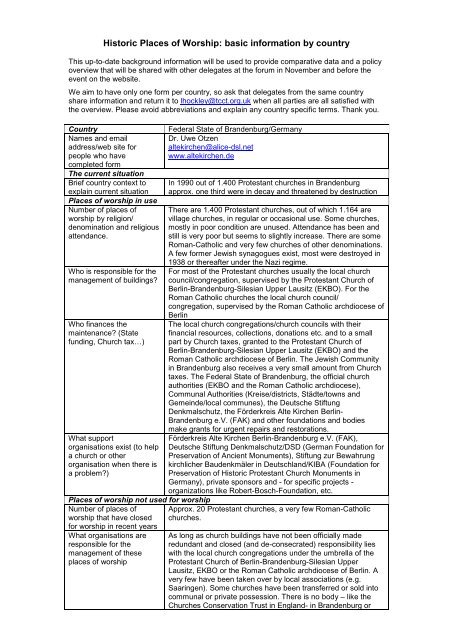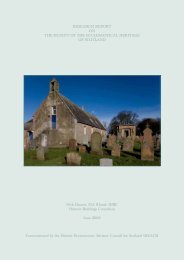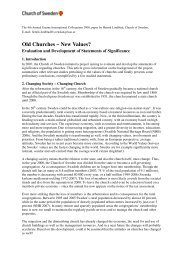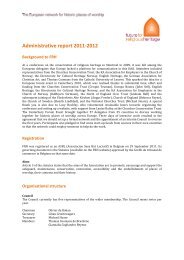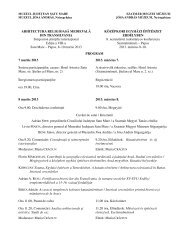2010, Germany, Dr. Uwe Otzen - Future for Religious Heritage (FRH)
2010, Germany, Dr. Uwe Otzen - Future for Religious Heritage (FRH)
2010, Germany, Dr. Uwe Otzen - Future for Religious Heritage (FRH)
Create successful ePaper yourself
Turn your PDF publications into a flip-book with our unique Google optimized e-Paper software.
Historic Places of Worship: basic in<strong>for</strong>mation by country<br />
This up-to-date background in<strong>for</strong>mation will be used to provide comparative data and a policy<br />
overview that will be shared with other delegates at the <strong>for</strong>um in November and be<strong>for</strong>e the<br />
event on the website.<br />
We aim to have only one <strong>for</strong>m per country, so ask that delegates from the same country<br />
share in<strong>for</strong>mation and return it to lhockley@tcct.org.uk when all parties are all satisfied with<br />
the overview. Please avoid abbreviations and explain any country specific terms. Thank you.<br />
Country<br />
Names and email<br />
address/web site <strong>for</strong><br />
people who have<br />
completed <strong>for</strong>m<br />
The current situation<br />
Brief country context to<br />
explain current situation<br />
Places of worship in use<br />
Number of places of<br />
worship by religion/<br />
denomination and religious<br />
attendance.<br />
Who is responsible <strong>for</strong> the<br />
management of buildings?<br />
Who finances the<br />
maintenance? (State<br />
funding, Church tax…)<br />
What support<br />
organisations exist (to help<br />
a church or other<br />
organisation when there is<br />
a problem?)<br />
Places of worship not used <strong>for</strong> worship<br />
Number of places of<br />
worship that have closed<br />
<strong>for</strong> worship in recent years<br />
What organisations are<br />
responsible <strong>for</strong> the<br />
management of these<br />
places of worship<br />
Federal State of Brandenburg/<strong>Germany</strong><br />
<strong>Dr</strong>. <strong>Uwe</strong> <strong>Otzen</strong><br />
altekirchen@alice-dsl.net<br />
www.altekirchen.de<br />
In 1990 out of 1.400 Protestant churches in Brandenburg<br />
approx. one third were in decay and threatened by destruction<br />
There are 1.400 Protestant churches, out of which 1.164 are<br />
village churches, in regular or occasional use. Some churches,<br />
mostly in poor condition are unused. Attendance has been and<br />
still is very poor but seems to slightly increase. There are some<br />
Roman-Catholic and very few churches of other denominations.<br />
A few <strong>for</strong>mer Jewish synagogues exist, most were destroyed in<br />
1938 or thereafter under the Nazi regime.<br />
For most of the Protestant churches usually the local church<br />
council/congregation, supervised by the Protestant Church of<br />
Berlin-Brandenburg-Silesian Upper Lausitz (EKBO). For the<br />
Roman Catholic churches the local church council/<br />
congregation, supervised by the Roman Catholic archdiocese of<br />
Berlin<br />
The local church congregations/church councils with their<br />
financial resources, collections, donations etc. and to a small<br />
part by Church taxes, granted to the Protestant Church of<br />
Berlin-Brandenburg-Silesian Upper Lausitz (EKBO) and the<br />
Roman Catholic archdiocese of Berlin. The Jewish Community<br />
in Brandenburg also receives a very small amount from Church<br />
taxes. The Federal State of Brandenburg, the official church<br />
authorities (EKBO and the Roman Catholic archdiocese),<br />
Communal Authorities (Kreise/districts, Städte/towns and<br />
Gemeinde/local communes), the Deutsche Stiftung<br />
Denkmalschutz, the Förderkreis Alte Kirchen Berlin-<br />
Brandenburg e.V. (FAK) and other foundations and bodies<br />
make grants <strong>for</strong> urgent repairs and restorations.<br />
Förderkreis Alte Kirchen Berlin-Brandenburg e.V. (FAK),<br />
Deutsche Stiftung Denkmalschutz/DSD (German Foundation <strong>for</strong><br />
Preservation of Ancient Monuments), Stiftung zur Bewahrung<br />
kirchlicher Baudenkmäler in Deutschland/KIBA (Foundation <strong>for</strong><br />
Preservation of Historic Protestant Church Monuments in<br />
<strong>Germany</strong>), private sponsors and - <strong>for</strong> specific projects -<br />
organizations like Robert-Bosch-Foundation, etc.<br />
Approx. 20 Protestant churches, a very few Roman-Catholic<br />
churches.<br />
As long as church buildings have not been officially made<br />
redundant and closed (and de-consecrated) responsibility lies<br />
with the local church congregations under the umbrella of the<br />
Protestant Church of Berlin-Brandenburg-Silesian Upper<br />
Lausitz, EKBO or the Roman Catholic archdiocese of Berlin. A<br />
very few have been taken over by local associations (e.g.<br />
Saaringen). Some churches have been transferred or sold into<br />
communal or private possession. There is no body – like the<br />
Churches Conservation Trust in England- in Brandenburg or
Who finances the abovementioned<br />
organisations?<br />
General in<strong>for</strong>mation<br />
Number of buildings of<br />
architectural or historical<br />
importance.<br />
Rural/urban issues<br />
Tax situation<br />
Have any surveys been<br />
compiled recently? (Please<br />
attach weblink or email<br />
document).<br />
Which subjects are of<br />
special concern?<br />
Which are the areas that<br />
could be helped by<br />
working together at a<br />
European level<br />
Predicted future national<br />
situation/direction it is<br />
heading<br />
Any other comments<br />
<strong>Germany</strong> which administers culturally important redundant<br />
churches, except <strong>for</strong> the Förderkreis Alte Kirchen Marburg in<br />
Hessen, which has looked after 4 redundant churches <strong>for</strong> over<br />
20 years. The FAK itself does not own any churches.<br />
As mentioned above, there is no organization which looks after<br />
redundant churches in Brandenburg<br />
Almost all 1.400 church buildings<br />
Rural-urban migration and increasing urban bias<br />
The Protestant, Roman Catholic and other Christian Churches<br />
and religious denominations pay the full VAT of 19% on all their<br />
activities, including repair and restoration of historic buildings,<br />
also paid by associations owning historic churches. The state<br />
gets back more than that it pays in grants. Full VAT also <strong>for</strong> new<br />
buildings. Persons paying income tax, paying subscriptions and<br />
making donations to charitable organizations supporting historic<br />
churches, such as local church councils, local associations <strong>for</strong><br />
churches and the FAK, are able to claim tax relief. Revenue<br />
from Church taxes is falling, due to declining church<br />
membership and high unemployment.<br />
By the Protestant Churches in <strong>Germany</strong>/EKD 2006, based on<br />
in<strong>for</strong>mation from the individual Churches, including the<br />
Protestant Church of Berlin-Brandenburg-Silesian Upper<br />
Lausitz, published in: Evangelische Kirche in<br />
Deutschland/Zahlen und Fakten zum kirchlichen Leben,<br />
Hannover 2009, see www.ekd.de/statistik/kirchen.html<br />
<strong>Dr</strong>amatic demographic change and peripheral economic decline<br />
in rural Brandenburg<br />
Reduction of VAT on repair and restoration work on churches.<br />
Awareness building and supporting a sense <strong>for</strong> the tremendous<br />
cultural and Christian heritage in rural and urban areas,<br />
promotion of churches as often main historic buildings in<br />
villages and towns, with their often very rich furnishings powerhouses<br />
of the cultural heritage, major sources of local identity.<br />
Need <strong>for</strong> better funding to repair and maintain many churches<br />
still in very poor condition.<br />
Forging urban-rural and other cross-sectional alliances <strong>for</strong><br />
sustaining historic places of worship<br />
It seems that above mentioned awareness is slightly increasing<br />
also due to the activities of the Förderkreis Alte Kirchen Berlin-<br />
Brandenburg e.V. However it is likely that in the future many<br />
more churches will be made redundant.


